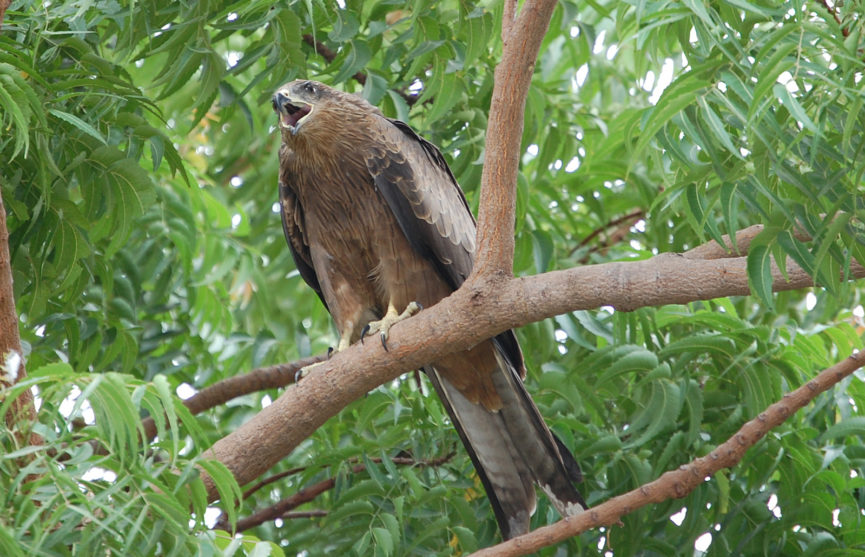“Sounds like he’s losing his voice, he’s been at it so long,” my husband David observed. The compromised voice due to prolonged distress calls belongs to a young hawk that clearly has been anxious about something—for over a week now. His high-pitched, fretful calling reverberates around our house each morning for hours. Forget about sleeping in. And distress calls from a hawk makes the surrounding bird population quite anxious as well. The robins are going crazy; our neighbor’s chickens are continually upset.
Usually I love hearing the distinctive bird songs welcoming a summer day. Lately the cacophony grates on the nerves, fueling my flight or fight mode.
“Maybe he can’t find his parents?”
“Or maybe they kicked him our of the nest to fend on his own and he’s telling them he’s not ready yet.”
“What if they died and he doesn’t understand?”
David and I have been trying to figure out what is causing the hawk’s deep anxiety. This morning I realized he first appeared with his distress calls around the time we heard about the immigrant children being separated from their parents. That realization hit me like a ton of bricks.
If distress calls from a young hawk impact me so much, how much more am I, and all of us, influenced by the on-going distress calls from innocent children and helpless parents?
How many horrified children have raw throats from crying for days? How many desperate parents have talked to countless government officials for so long, they have lost their voices, both literally and figuratively?
Sobered, I poured myself a second cup of coffee and as I headed to the microwave to heat it, there was Hawk in all his anxious raptor magnificence, perched on our deck railing, quiet now, looking right at me. I froze.
How to explain what it feels like to be stared down by a wild hawk? His huge eyes penetrated, pleading something—what I couldn’t tell. He seemed to frown. I looked into his eyes and sent him as much love and grace as my heart could muster in the moment. He seemed to calm if only for a few seconds. He looked away and then looked back at me, as if to say, “I appreciate you trying.” In one swoop of his huge wings, he was off to sit in a near-by tree. And yes, you guessed it. He continued those disturbing distress calls in that wearied, forlorn voice.
And now as I write about this encounter, I want to make sense of it—to glean meaning from it as the meaning making human I am.
I have been thinking a lot lately about humans as a symbolic species in preparation for a new blog post for Left to Our Devices and for writing a new section in my upcoming book. So I decided to consider the appearance of Hawk at the same time I started reading Henry Giroux’s latest book, American Nightmare: Facing the Challenge of Fascism, as a Sign.
If you know me personally, you know I admire Giroux’s work a lot. He clarifies the reality we are in, with keen examination of critical factors from all sectors, to give us an astute understanding of complex issues. From media, to popular culture, to today’s political landscape, when I read his books, I have to hold back from highlighting every sentence, lest the entire book become neon yellow. And yet, maybe that wouldn’t be such a bad thing. It would certainly show his work to be the clarion call that it is.
American Nightmareis just off the press. I haven’t finished it yet. But I have read enough to have made a decision that is my moral obligation to tell as many people as I know about it. This morning Hawk confirmed this decision.
I will leave you with words from the book’s introduction by George Yancy, professor of philosophy at Emory University:
“Like Martin Luther King Jr., Giroux writes with a sense that social injustice is both a chronic intergenerational condition, and urgent to address in the here and now. Like James Baldwin, he recognizes that action requires commitment and that commitment is dangerous within the context of hegemonic orders that subject critical consciousness to erasure. And like Rabbi Abraham Joshua Heschel, he knows that America is in a state of moral emergency, standing on the precipice of self-destruction…‘Dystopia,’ as Giroux makes clear, ‘is no longer the stuff of fiction, it has become the new reality’…At the end…he reminds us, ‘The time to wake up in now.’”
Copyright, Gloria DeGaetano, 2018.
